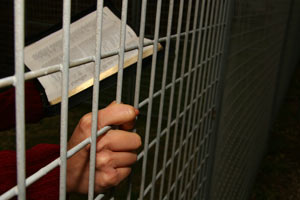
Prisoners’ Plea Proscribed: High Court Limits Inmates’ Religious Liberty Lawsuits
APRIL 22ND, 2011
BY SANDHYA BATHIJA
The justices ruled 6-2 that prisoners cannot seek money damages from the state when their rights are violated under the Religious Land Use and Institutionalized Persons Act (RLUIPA). The federal statute’s purpose, in part, is to protect prisoners’ rights to practice their religion.
The case considered a situation at a Texas penitentiary, in which Harvey Sossamon III and other inmates on disciplinary restrictions were not allowed to attend Christian worship services in the prison chapel. However, inmates were allowed to us the chapel for non-religious purposes and could leave their cells for non-religious reasons, such as educational classes and using the library.
Sossamon, arguing that the policy violated his religious freedom, filed a lawsuit against Texas, claiming that since the state receives federal funds to run the prison, he should be entitled to “appropriate relief” under RLUIPA.
Both the federal district court and the 5th U.S. Circuit Court of Appeals dismissed Sossamon’s claim, citing state sovereign immunity, a legal doctrine that protects states from lawsuits seeking monetary damages.
On April 20, the U.S. Supreme Court agreed with the lower courts.
Writing for the majority in Sossamon v. Texas, Justice Clarence Thomas said that just because a state receives federal funds, it does not waive its sovereign immunity.
The ruling still allows prisoners to receive injunctive relief under the statute. This means a court could still order a state to change prison policies that burden inmates’ religious freedom and violate RLUIPA.
Justice Sonia Sotomayor, joined by Justice Stephen Breyer, dissented, asserting that denying money damages “severely undermines” the intent of Congress in passing RLUIPA in 2000. (Justice Elena Kagan recused herself due to prior involvement in the case as solicitor general.)
“By depriving prisoners of a damages remedy for violations of their statutory rights,” observed Sotomayor, “the majority ensures that plaintiffs suing state defendants under RLUIPA will be forced to seek enforcement of those rights with one hand tied behind their backs.”
Sotomayor and Breyer are right. By denying money damages, the decision gives states little incentive to ensure respect for the constitutional rights of inmates, as Americans United argued in its friend-of-the-court brief.
AU joined with seven organizations on the brief, including the Baptist Joint Committee for Religious Liberty, the American Jewish Committee, the American Civil Liberties Union and Interfaith Alliance Foundation.
The brief asserted that the purpose of RLUIPA is to deter “pervasive and unjustified burdens on religious exercise.” In order to achieve this, prisoners need to be able to seek both injunctive and monetary remedies.

APRIL 22ND, 2011
BY SANDHYA BATHIJA
The justices ruled 6-2 that prisoners cannot seek money damages from the state when their rights are violated under the Religious Land Use and Institutionalized Persons Act (RLUIPA). The federal statute’s purpose, in part, is to protect prisoners’ rights to practice their religion.
The case considered a situation at a Texas penitentiary, in which Harvey Sossamon III and other inmates on disciplinary restrictions were not allowed to attend Christian worship services in the prison chapel. However, inmates were allowed to us the chapel for non-religious purposes and could leave their cells for non-religious reasons, such as educational classes and using the library.
Sossamon, arguing that the policy violated his religious freedom, filed a lawsuit against Texas, claiming that since the state receives federal funds to run the prison, he should be entitled to “appropriate relief” under RLUIPA.
Both the federal district court and the 5th U.S. Circuit Court of Appeals dismissed Sossamon’s claim, citing state sovereign immunity, a legal doctrine that protects states from lawsuits seeking monetary damages.
On April 20, the U.S. Supreme Court agreed with the lower courts.
Writing for the majority in Sossamon v. Texas, Justice Clarence Thomas said that just because a state receives federal funds, it does not waive its sovereign immunity.
The ruling still allows prisoners to receive injunctive relief under the statute. This means a court could still order a state to change prison policies that burden inmates’ religious freedom and violate RLUIPA.
Justice Sonia Sotomayor, joined by Justice Stephen Breyer, dissented, asserting that denying money damages “severely undermines” the intent of Congress in passing RLUIPA in 2000. (Justice Elena Kagan recused herself due to prior involvement in the case as solicitor general.)
“By depriving prisoners of a damages remedy for violations of their statutory rights,” observed Sotomayor, “the majority ensures that plaintiffs suing state defendants under RLUIPA will be forced to seek enforcement of those rights with one hand tied behind their backs.”
Sotomayor and Breyer are right. By denying money damages, the decision gives states little incentive to ensure respect for the constitutional rights of inmates, as Americans United argued in its friend-of-the-court brief.
AU joined with seven organizations on the brief, including the Baptist Joint Committee for Religious Liberty, the American Jewish Committee, the American Civil Liberties Union and Interfaith Alliance Foundation.
The brief asserted that the purpose of RLUIPA is to deter “pervasive and unjustified burdens on religious exercise.” In order to achieve this, prisoners need to be able to seek both injunctive and monetary remedies.







0 comments:
Post a Comment